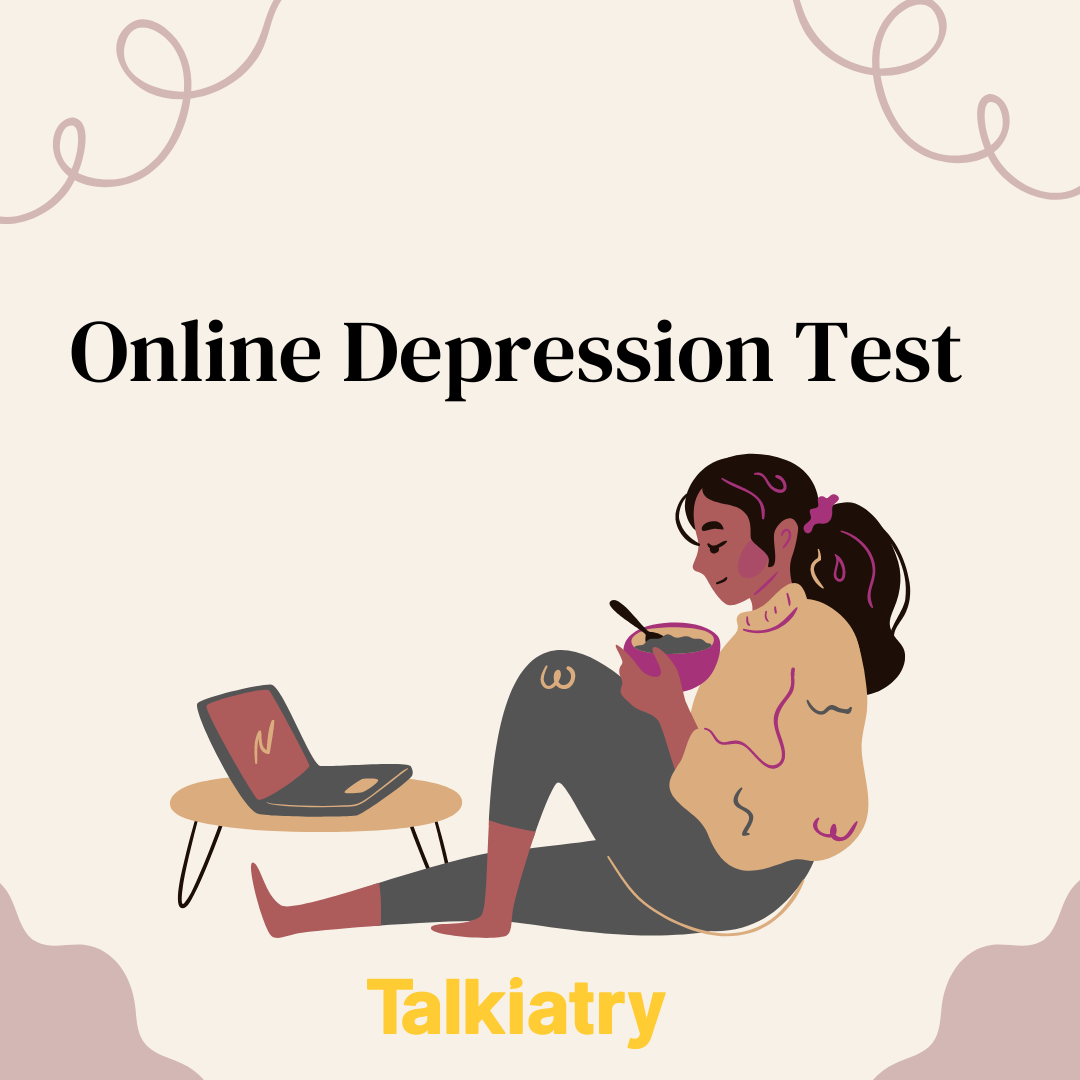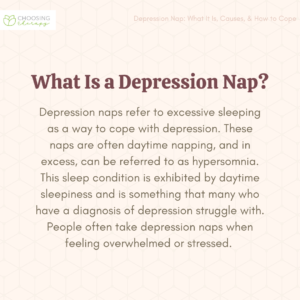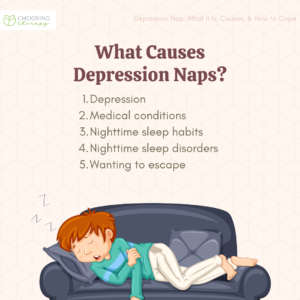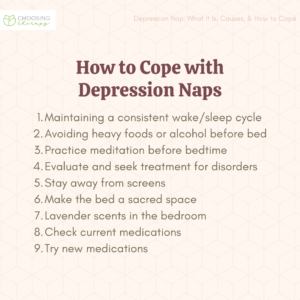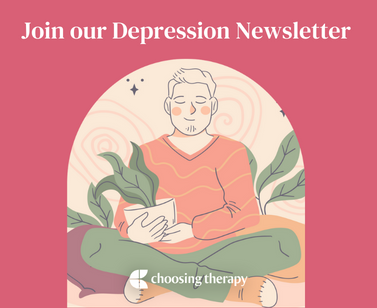Depression naps often result from subconscious feelings of exhaustion due to depression, and taking naps may be the only way some people can cope with the symptoms. There are strong connections between sleep health and mental health, and hypersomnia can be a symptom of depression, leading to the term “depression naps.”
Depression Is Treatable With Therapy
Would you like to feel more happiness and joy? BetterHelp has over 20,000 licensed therapists who provide convenient and affordable online therapy. BetterHelp starts at $65 per week. Take a Free Online Assessment and get matched with the right therapist for you.
What Is a Depression Nap?
Depression naps refer to excessive sleeping as a way to cope with depression. These naps are often daytime napping, and in excess, can be referred to as hypersomnia. This is a sleep condition that is exhibited by daytime sleepiness and something that many who have a diagnosis of depression struggle with. People often take depression naps when feeling overwhelmed or stressed.
The phrase depression nap has become a popular social media, making it easier to dismiss concerns and legitimize depression naps without taking steps to address the underlying causes. This is dangerous as the popularization and misuse of the term can leave many who struggle with depression feeling as if their struggles are being minimized if they speak up.1
The Connection Between Depression & Tiredness
There is a strong connection between sleep, tiredness, and depression. Many with depression struggle with excessive feelings of fatigue and tiredness, which leads to excessive sleep at night and during the day. At least half of those with depression have experienced severe sleep disturbances due to their depression symptoms of fatigue and tiredness.
Having a diagnosis of depression means you may be more likely to have sleep-related symptoms. Excessive sleepiness during the day can also be a symptom of depression, as sleep processes and mood regulation are highly intertwined. Those who struggle with depression and sleep disturbances may also be more likely to experience sleep apnea.2
What Causes Depression Naps?
While it can be a common desire to take a nap when you are feeling down, taking daytime naps frequently with excessive sleep during a 24-hour period can be a symptom of depression. Sleep is important in maintaining the mind and body as well as mood regulation. Little or low-quality sleep is linked to daytime sleepiness and less regulated mood due to the sleep processes which didn’t occur. This is seen in insomnia. However, any sleep disturbance is linked to mood-related issues.3
Potential causes of depression naps include:
- Depression: It is important to know that depression may lead to napping as a way to cope. Sleep can be restorative, but it can also be the only coping mechanism some know.
- Medical conditions: Certain medical conditions, like sleep apnea and heart conditions, can be linked to depression naps, as these conditions can leave you with poor-quality sleep. When you have poor quality sleep, it can increase your chance of developing depression.
- Nighttime sleep habits: Poor nighttime sleep routines can leave you feeling tired, overstimulated, and generally irritable due to low-quality sleep.
- Nighttime sleep disorders: Hypersomnia and insomnia can leave you feeling tired during the day as the body cannot handle regulating your mood based on too much, too little, or low-quality sleep.
- Wanting to escape: When you feel stressed and overwhelmed, sleeping can be a way to avoid problems and give you time away.2
The Benefits of Depression Naps
Taking a daytime nap isn’t necessarily a sign of depression, and it may have some benefits. Naps can be helpful and restorative and, in isolation, can be healthy for you to maintain homeostasis.
Benefits of occasional daytime napping include:
- Improved memory: Naps help us to process information and memory, and when we nap during the day, some are able to recall that information and memory easier.
- Improving emotional information processing: When you nap and are feeling rested, you are able to better process complex and abstract emotions and situations.
- An occasional escape: Naps as a coping mechanism aren’t unhealthy if they are not done excessively. Sleep helps us to manage our stress and emotions.
- Improved physical health: Naps can also be helpful when dealing with medical issues and can give your body the rest it needs to function the rest of the day.
Help For Depression
BetterHelp – Get help from a licensed therapist. BetterHelp offers convenient and affordable online therapy starting at $65 per week. Free Assessment
Talkspace – Online Therapy With Or Without Insurance. Talkspace accepts many insurance plans including Optum, Cigna, and Aetna. Typical co-pay is $30, but often less. Get started
When to Seek Help for Depression Napping
Depression naps also come with concerns connected to daytime napping/tiredness. Too much sleep can be linked to health issues linked to weight, which impact sleep quality and heart health.
It may be time to seek help for depression naps if:
- You are chronically napping to escape stress or life.
- You are napping to avoid being productive
- You have no reason for napping
- They are interfering with nighttime sleep
- They are interrupting or affecting daytime functioning
- You still feel tired after a depression nap
- You are starting to have other mental health symptoms and/or physical symptoms4
How to Cope With Depression Naps
How you cope with depression naps may differ from how someone else copes. Coping will vary based on the cause of depression naps. However, there are some basic tips to help with this. It’s important to try multiple things if you continue to have sleep disturbances and understand that you may need further treatment.
Tips for coping with depression naps include:
- Maintaining a consistent wake/sleep cycle: Routine helps give our body structure, so having a routine can be really helpful to help your body learn when it is time to wake and sleep.
- Avoiding heavy foods or alcohol before bed: Eating and drinking at night can spike blood sugar and raise our body temperature and heart rate, which are all linked to sleep-related issues at nighttime.
- Practice meditation before bedtime: Meditation for depression is helpful as it helps to ground you in the present time and place. It helps to clear mental clutter and gives you a better chance of having good quality sleep.
- Evaluate and seek treatment for disorders: Getting an evaluation or consult from a therapist or physician can be helpful to rule out other medical issues that may be contributing.
- Stay away from screens: Screens emit a lot of blue light, which is known to keep you awake and interrupt your sleep at night.
- Make the bed a sacred space: If you are doing everything from your bed, your body and brain may associate your bed with activities that do not involve rest, which may make it harder for you to sleep.
- Lavender scents in the bedroom: Having a lavender spray, essential oils or even fresh lavender bedside can help to promote relaxation which may be the support you need to get comfortable enough to sleep.
- Check current medications: If you are taking any medications, make sure you check to see what the side effects are and speak with your physician if you feel this may be related to your medications.
- Try new medications: It can be helpful to speak with your therapist or physician to try medications if you need further support.
Treatment for Depression Naps
If you’ve tried the tips explained above and still end up taking depression naps, it may be time to consider therapy for depression. With so many symptoms, some aspects of depression can go unobserved as you adapt to them. The onset may come on slowly and become a part of your daily life before you recognize it may be depression.
It can be hard to know how to start with therapy. Online therapy options allow you to explore counseling in a more convenient way. You can identify a therapist specializing in depression and sleep through an online therapist directory that allows you to sort by specialty. Additionally, depression naps may impact your physical well-being, so be sure to discuss them with your primary healthcare provider.5
Final Thoughts
What you are dealing with is unique to you, but you are not alone. Depression naps may or may not be a sign of depression, but it’s important to understand the reason for taking extra naps. Learning more about your sleep habits and learning healthy habits can make a big difference in how you feel.
Additional Resources
To help our readers take the next step in their mental health journey, Choosing Therapy has partnered with leaders in mental health and wellness. Choosing Therapy is compensated for marketing by the companies included below.
Talk Therapy
Online-Therapy.com – Get support and guidance from a licensed therapist. Online-Therapy.com provides 45 minute weekly video sessions and unlimited text messaging with your therapist for only $64/week. Get Started
Online Psychiatry
Hims / Hers If you’re living with anxiety or depression, finding the right medication match may make all the difference. Connect with a licensed healthcare provider in just 12 – 48 hours. Explore FDA-approved treatment options and get free shipping, if prescribed. No insurance required. Get Started
Depression Newsletter
A free newsletter from Choosing Therapy for those impacted by depression. Get helpful tips and the latest information. Sign Up
Learn Anti-Stress & Relaxation Techniques
Mindfulness.com – Change your life by practicing mindfulness. In a few minutes a day, you can start developing mindfulness and meditation skills. Free Trial
Choosing Therapy Directory
You can search for therapists by specialty, experience, insurance, or price, and location. Find a therapist today.
Online Depression Test A few questions from Talkiatry can help you understand your symptoms and give you a recommendation for what to do next. Best Online Psychiatry Services Online psychiatry, sometimes called telepsychiatry, platforms offer medication management by phone, video, or secure messaging for a variety of mental health conditions. In some cases, online psychiatry may be more affordable than seeing an in-person provider. Mental health treatment has expanded to include many online psychiatry and therapy services. With so many choices, it can feel overwhelming to find the one that is right for you.